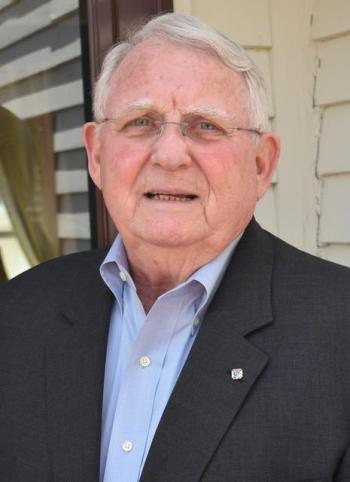3 seek 2 seats on Wiscasset select board
Three candidates are seeking two, two-year terms on the Wiscasset select board. The annual election is Tuesday, June 8. In-person voting Election Day is at Wiscasset Community Center from 8 a.m. to 8 p.m. For information about voting absentee, contact the town clerk. To download an application to request an absentee ballot, visit wiscasset.org
Unopposed candidates on the ballot include Desiree Bailey and Indriani Demers for the school committee and Phil Di Vece for Wiscasset Water District trustee. All three are incumbents. No candidates are on the ballot for eight vacancies on the Budget Committee. Jefferson Slack and Katharine Martin-Savage chose not to seek re-election to the select board. Their successors would each be new to the five-member board.
Wiscasset Newspaper asked the select board candidates for brief biographies including their community involvement and membership in professional organizations. They were also asked to share what they believe are the most pressing issues facing the community.
Terry Heller of Morton Street describes herself as an editor, writer, musician and community volunteer. After moving to Wiscasset four years ago, she became active in the select board’s committee on the appearance of the town, serving as its chairman for two years. She’s a member of the Friends of Wiscasset Village, Garden Club of Wiscasset, Wiscasset Yacht Club and Wiscasset Female Charitable Society.
Before retiring, Heller served on the Texas Senate Education Committee for 20 years; was a fiscal policy writer, served five years on the State of Texas Legislative Budget Board and was a policy analyst. She served on the University of Texas System Board of Regents and Texas Higher Education Coordinating Board for five years. Heller earned a bachelor’s degree and a master’s degree in music and a PhD in education research at the University of Texas, Austin.
“The number one issue facing our community is a question raised about our schools and finding a way to lower taxes. I live on a fixed income, as many here do, and yet paying for our schools is an important job of our community. How we do that is always a high priority and a balance of values, costs, and outcomes,” wrote Heller.
“A longtime idea that keeps coming up is tuitioning out our high schoolers to lower the school budget and cut taxes. It’s on the June town warrant for a vote. But the high school costs are only part of the overall school budget, and the school budget is only part of our overall town taxes. On the surface, it wouldn’t save much. And what would we lose?
“There is a tremendous element of pride in what our high schoolers are accomplishing. During April, a delegation of students presented an excellent climate change proposal for our select board to consider adopting for our community. Even raising the question of saving money by giving away our high schoolers is rather disheartening. According to the National Center for Education Statistics, we’re not paying any more per student than the closest comparably sized high school (Boothbay Region). And Wiscasset schools were recently ranked No. 13 in the state (US News & World Report).
“It looks like our school committee and our WMHS teachers and administrators are knocking it out of the park – so why would we want to even ask the question?”
“We’ve all seen the waterfront park over in Bath. Why couldn’t we do that? And White’s Island needs new footbridges. How hard can it be? Boothbay has Windjammer Days. We have a deeper history as well as a deeper harbor. Why couldn’t we do something like that?
“We have a great team of people revving up to make Wiscasset Schoonerfest happen in August 2021 featuring 11 bands and chantey singers appearing on two stages on the common and at the pier and a lighted boat parade. Neighbors and shopkeepers and interested residents are working together to make this happen,” she continued.
Heller said when she left Texas and moved to Maine she knew she had found a home when she arrived in Wiscasset.
“Service is in my DNA,” she stated. “What we learned growing up in the 1950s and 60s was that anything was possible. At home we learned to listen to, and care about others,” she wrote. “If we were lucky, we learned from professional life how to generate good will, and to bring everyone to the table to get things done. Listening to people and then energizing the ideas they help create are key to everything in community service,” she concluded.
Dusty Jones of Hale Pond Road joined the U.S. Navy in 1993 and served a six-year enlistment. He trained as a nuclear power plant electrician and served aboard the USS Carl Vinson for two tours in the Persian Gulf. After the Navy, he worked for a utility company plotting and installing underground electrical and other utilities in North Texas while attending college. He earned a bachelor’s degree and and a master’s degree in behavior analysis.
“As a behavior analyst for 20 years, I developed treatment and care programs for folks with behavioral needs, both for individual households and large-scale treatment institutions. Early in my career I was quite effective as a practitioner, and later took positions as team leader and program director. My work first brought me to Wiscasset in 2011, 2012 when I had clients in the elementary and middle schools here,” he wrote.
When his consultant work ended, Jones decided to make Wiscasset his home. “I spent the last several years of my career writing educational curricula,” continued Jones.
“In the Navy, I built and ran a very effective program designed to rehabilitate incarcerated servicemembers. I’ve established treatment programs for schools, school districts, treatment facilities and multi-facility operations, including employee training and management programs. I have experience working with government planners and auditors from both government and private funding institutions.
“I have always been politically active,” stated Jones. “One reason I wanted to eventually settle down was for the opportunity to serve in a local office.”
Jones wrote, Wiscasset faces the kinds of issues all small towns face: the cost of meeting civil responsibilities versus limitations of revenue. “Everyone I’ve talked to has expressed their concerns for Wiscasset’s schools. And there’s also the wasterwater treatment plant which needs maintenance and upgrades.” He describes these as “fairly typical municipal challenges.
“We’ve inherited some issues whose due dates have arrived, and some of them are going to be costly,” he continued.
“Wiscasset is prime for economic development. Fortunately, many of the items in need of maintenance serve not only as expenses, but investments; the kinds of things that, once done, are certain to attract visitors and others interested in doing business here,” wrote Jones.
“We have many assets here not yet realizing their full potential that with a little work, could become economic engines. In a time following a pandemic when people are motivated to travel and relocate, and when there is a federal government offering aid for infrastructure improvements, and in an economy that thrives on photo spots and points of interest, leaving the more fascinating aspects of our town in disrepair could be costing us money, he added. As examples he named the Ancient Cemetery fence and White’s Island footbridges both in need of replacement.
“The near-even split between those who want to invest in town improvements and those who would rather limit spending requires sensitivity, patience and synthesis. I am encouraged by the development of the waterfront, the solar project under consideration at the airport, the Johnson memorial. I’d like to lean heavily on private funding sources and fundraising initiatives for some of these things. The time to act is now,” stated Jones.
“I want us to take full advantage of the opportunities available in the coming economy, including investments in green energy and new ventures created by changes in American life, work and leisure,” he wrote. “I look forward to helping Wiscasset compete and remain competitive in the environment of economic growth going on all around us.”
William “Bill” Maloney of Federal Street is a retired director of sales and marketing for an international company serving the U.S. and Canada. A U.S. Navy veteran, he attended New England School of Accounting. Last year, Maloney lost his bid for a seat on the select board by six votes when six candidates were running for three openings.
Maloney has served on Wiscasset’s Downtown Public Advisory Committee working with Maine Department of Transportation on the recently completed multi-million dollar downtown improvement project. He is chair of the Budget Committee and chair and treasurer of Wiscasset Senior Center. He’s treasurer of Wiscasset Rod & Gun, a member of All Saints Parish Finance Committee in Newcastle and Financial Secretary for the Knights of Columbus, also in Newcastle. Before moving to Maine, Maloney served as president of a police pension fund, chaired a Human Rights Commission and was chairman of the Planning Commission in Wheeling, Illinois.
He said, “I am originally from central Massachusetts. In 1977, I accepted a transfer to the Chicago suburbs and lived there for 36 years. Following retirement (wife) Lynn and I decided to return to New England. We had vacationed in Maine many times and we liked the Wiscasset area. We wanted to be closer to our family in Massachusetts, where our two sons, Jack and Tim, and our six grandchildren live. We both have relatives scattered throughout the New England states.
Maloney wrote, “Future capital expenditures need to be charted so that we do not have unexpected large budget expenditures. “We need to look at how we are doing things. Do we need to do them? Can we do them more efficiently?
“We also need to build a broader tax base, bringing more property owners and businesses into our community, without changing the character of the town. We need to increase our tax base to keep our property taxes down, without changing the character of the town,” he continued. “It is not an easy job, but each new home brings in more than $3,000 in real estate tax to the town. A new business brings in more tax revenue and jobs for residents. With cooperation many things beneficial to the town can happen,”
Maloney said, if elected, he will bring a solid background in business to the select board. “During my career in both business and in various appointed town government positions, I have worked with others to bring new ideas to fruition through teamwork and interaction with both elected and appointed officials.
“In business, I worked with union workers to redesign how they worked to increase productivity that gave the business 20 additional years of existence. In government, I spearheaded a small group of town officials and appointed committee members to create a downtown. We returned with the proposal short of six months at no cost to the town and it became a $110,000,000 development. “This is not one I would recommend for Wiscasset; however, it was great for the recipient town of Wheeling, Illinois, a town that grew from 1,000 population in 1950 to a town of 40,000 people today,” Maloney added.
Absentee ballot requests must be received by the town clerk by the close of the business day, Thursday, June 3. Voted absentee ballots must be received by the town clerk by 8 p.m. on Election Day.
Event Date
Address
United States

































